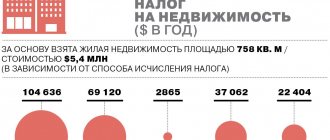Tax woke up
Lists of lands overgrown with weeds for individual housing construction are now being compiled in Rosreestr, warned deputy head of the department Maxim Smirnov.
He explained that this year, for the first time, the “dormant” norm of the Tax Code, according to which empty plots are subject to double tax, begins to be applied. At risk of increased taxes are also “under-registered” acres of land, which citizens registered in the cadastral register before March 1, 2008, but never registered ownership of them. Rosreestr can deregister them. However, first, owners of plots registered in the Unified State Register of Real Estate will be notified of the start of the procedure.
If a person does not register ownership, then six months after the notifications are sent, the plot will be removed from the cadastral register and purchase and sale transactions with it will become impossible.
House through MFC
Registration of property rights to real estate has become much easier this year, says Maxim Smirnov. “If previously it was necessary to apply to two bodies at once - the Federal Cadastral Chamber (to register property in the cadastral register) and to Rosreestr (to draw up a document on ownership), now it is enough to submit all the papers to the multifunctional office once.
And thanks to the new Federal Law “On State Registration of Real Estate”, it is now possible to register rights to an apartment or land in any city at any MFC in the country, and not, as before, at the location of the property. Since the beginning of the year, more than 40 thousand applications have already been submitted under this extraterritorial principle.
Is it possible to avoid paying land tax?
“FACTS” have already told their readers about two “property” taxes, receipts for which must be sent out before July 1: the car tax and the real estate tax. However, we have a third “property” tax that our fellow citizens pay every year - land tax. And receipts for its payment must also be sent out before July 1. Oleg Dobrovolsky, partner of the legal association ID LegalGroup, told FACTS about who pays the land tax, what land plots it applies to and whether it is possible to avoid paying it.
- Let's start with the main thing. Who pays land tax?
— Individuals who own land plots are required to pay it.
— Which land plots exactly?
— All shares that are owned by individuals. These can be plots for the construction and maintenance of a residential building, outbuildings and structures (garden plot), agricultural land, for gardening, for personal farming, vegetable gardening, and so on.
— Do dacha plots count among the objects on which taxes are paid?
- Yes, they do, and not only country houses. The objects of such taxation are land plots occupied by gardens and country houses of individuals for personal subsidiary farming, gardening, vegetable gardening, haymaking and grazing.
A very important condition for determining the object of land taxation is that this plot is owned by such an individual.
— What about the plots of land on which ordinary houses stand in the village?
— The same rules apply as for summer cottages. These are land plots for personal farming.
— Under what conditions is it considered that a land plot is “owned”? Should it be properly formatted?
— If a land plot is registered in the State Land Cadastre and has a cadastral number, then it is considered legally formalized.
— What if the plot is not registered and does not have a number?
- Indeed, there are such cases. Land plots for which ownership was obtained before 2004 do not have a cadastral number. But at the same time, they are considered formed in accordance with the Law of Ukraine “On the State Land Cadastre”.
The absence of a cadastral number indicates that information about such a plot is not included in the State Land Register. This deficiency in the legal regime of the land plot can be easily corrected by submitting an appropriate application on behalf of the owner.
— What kind of tax is paid on land? At what rate?
— The land tax rate is established exclusively by a decision of the local government in the territories where the land plots are located. However, there is a limitation - it cannot be more than three percent of the normative monetary value of the site (taking into account the indexation coefficient).
— How do people find out how much their land is worth?
— Each individual who owns the right of ownership of a land plot has the right to obtain information about his plot by its cadastral number. To do this, you need to contact the center for the provision of administrative services or order an electronic extract on the normative monetary valuation of land on the State GeoCadastre website.
To receive the State GeoCadastre service, an individual must perform the following actions:
- go to the above-mentioned Internet address;
- register in your electronic account using email, electronic digital signature or bank payment card (BankID);
- in the “E-services” electronic account window, in the “NDO” section, fill out an application to receive an extract. It is necessary to indicate the cadastral number of the land plot, the applicant’s full name, fill out other fields of the application form, give consent to the processing of the customer’s personal data and “send” the application.
After processing the request, a letter will be sent to the applicant’s email address with information on how to receive the ordered extract from the technical documentation of the NDO.
The service is provided free of charge. The execution time is no more than three working days from the date of receipt of the order.
— How does the regulatory authority receive information about the regulatory monetary valuation of land plots? Should I provide it to the tax service myself?
- And here we have changes - on January 1, 2020, changes came into force regarding the procedure for obtaining information on the regulatory monetary valuation of land plots by regulatory authorities.
- Which ones exactly?
— Now the State Agency of Land Resources sends the fiscal authority information (in electronic form) about the completed regulatory monetary assessment of land plots as of February 1, 2020. The regulatory authority publishes this information on its official website.
Thus, the official website of the fiscal authority contains summary information on the amount of established land tax rates and the normative monetary valuation of land plots in the relevant territories.
- Clear. What if the regulatory monetary valuation of the site was not carried out?
— If there is no such monetary valuation of land, the tax base will be the area of the land plot. It is indicated in the document that confirms ownership of the land: in the certificate of ownership of real estate.
- Well, I'm completely confused. Who should determine what land tax a person needs to pay - the person himself or the fiscal service?
— The amount of tax that needs to be paid to the budget is calculated and determined exclusively by the controlling authorities at the location of the land plot.
- When?
— The decision to pay land tax is sent by the regulatory authority by mail or handed to the taxpayer at his place of registration before July 1.
But I want to tell you that in connection with the changes made to the Tax Code from 2020, an individual owner of a land plot is exempt from fines and penalties for late payment of land tax if the regulatory authority has not sent or handed over a decision by July 1.
- It's clear. That is, if I did not receive any decisions or receipts by July 1, then this is not my concern?
- From 2020 - yes. If the regulatory authority does not make a decision on tax payment or an individual does not receive such a decision, the liability of the owner of the land plot is not provided for by current legislation.
— Then the answer to the question is very important: in what case is it considered that a tax decision has been served?
— The norms of the current legislation determine that the decision is considered to be served on an individual in the following cases:
- if the decision is sent to the place of residence with notification of delivery;
- delivered personally to an individual or his representative.
- What if I refuse to make a decision?
— There are clear positions that determine when a decision is considered handed to an individual. If it was delivered personally to a citizen or his representative, as well as when sent to the address of residence with a notification of delivery.
If the post office cannot deliver such a decision in the absence of the owner at the place of residence or he refuses to make a decision to receive the letter, or did not come to the post office to receive the letter, then the tax notice-decision is still considered to have been delivered from the day noted by the postal service in the notification of delivery indicating the reasons for non-delivery.
— Does the regulatory authority have the right to charge land tax for 2020 after a legally defined period - after July 1, 2020?
- Yes. The innovations that came into force in January 2020 provide that regulatory authorities have the right to charge individuals who are owners of land plots land tax for 2020 no later than 1095 days (three years) from the last day of the deadline for paying land tax for 2018 .
That is, the tax service can charge land tax for 2018 until July 1, 2021.
- It's clear. When do you have to pay land tax?
— An individual who is the owner of a land plot must pay the tax within 60 days from the date of delivery of the decision on payment.
— What punishment is provided for those who have not paid the tax?
— If a decision is received from a regulatory authority and the tax is not paid within 60 days, the law provides for liability in the form of a fine and penalty.
— For what period will land tax be calculated in 2018?
— For the reporting year 2018.
- That is, in advance?
- Actually, yes.
— What if I pay the tax in July and sell the plot in August?
— In case of transfer of ownership of a land plot during 2020, payment of land tax is carried out by two owners.
The previous one pays tax for the period from January 1, 2020 to the beginning of the month in which his ownership of such a plot ceased.
And the new owner of the land must pay tax from the month in which he acquired ownership.
- But I will already pay the tax in full in July!
— In this case, the previous owner of the land must provide the fiscal service with information about the transfer of ownership of the plot.
- Will my money be returned? How?
— The previous owner provides the regulatory authority with original documents on the transfer of ownership of the land plot. The control body, within ten working days, recalculates the amount of land tax and sends or delivers to the individual a new tax notice-decision. The previous one is considered canceled or withdrawn. And the amount of overpayment for this tax must be returned.
— Let’s say I didn’t receive a decision before July 1, but I’m a very conscientious citizen and want to pay the tax. Can I do this somehow?
- Yes. If the payer does not receive a decision, or the owner of the plot has the right to use the benefit, or the owner changes, then the person has the right to contact the fiscal authorities (at the location of the land plot) and provide the relevant documents.
- By the way, what if I received a decision on my plot, but it does not correspond to its area - instead of six acres, they calculated a tax for 60 acres?
— In case of discrepancies in the data (area of the plot, the right to use the benefit, the tax rate, the accrued amount of tax), an individual has the right to submit a written application to the regulatory authority to reconcile the data.
If the regulatory authority identifies inconsistencies based on the original documents submitted for verification by an individual, then within ten working days it recalculates the tax and sends or delivers a new tax decision.
The previous decision is considered cancelled.
In addition, the owner of the site has the right to administratively appeal the decision within 30 days after receiving the receipt.
— Who gets benefits for paying land tax?
— In accordance with the law, the following persons are exempt from paying land tax:
- disabled people of the first and second groups;
- individuals raising three or more children under the age of 18;
- old age pensioners;
- war veterans and persons subject to the Law of Ukraine “On the Status of War Veterans”;
- individuals who suffered as a result of the Chernobyl disaster and are officially recognized by law.
Very important: from January 1, 2020, the restriction on the use of benefits for one type of plot was canceled.
- What does it mean?
— And the fact that from 2020 the application of benefits applies to areas for each type of use within the boundary standards. Until 2018, this benefit applied to only one plot of each type.
Let's say an individual owns two or more land plots of the same type of use, and the total amount of these plots exceeds the preferential norms. In this case, it becomes necessary to independently select the land plot that will be exempt from paying land taxes.
Let's look at an example.
An individual owns two land plots. The intended purpose is the same - for gardening. The area of the plots is 0.07 hectares and 0.08 hectares. The total total area is 0.15 hectares. In accordance with the Tax Code, the preferential rate for this type of land plot (for gardening) is no more than 0.12 hectares.
Since the total area of these two plots exceeds the preferential 0.12 hectares, it means that it is necessary to choose one of them (0.07 hectares or 0.08 hectares) that will be preferential. And submit a written statement to the fiscal authority. Then you won’t have to pay land tax for it.
But this had to be done before May 1, 2020.
* Photo by Svetlana ELSHANSKAYA, “FACTS”
11906
Read us on the Telegram channel, Facebook and Twitter
Make FACTS your favorite source on Google News
Technical plan required
From January 1, 2020, registration of garden and country houses requires a technical plan, which is prepared by cadastral engineers. These specialists are on staff of many private and public organizations - for example, in BTI.
Prices for their work vary and depend on the size of the buildings - the larger the square footage, the higher the cost. Specialist services rarely cost less than 10 thousand rubles.
There are 28 thousand cadastral engineers in Russia today. Everyone must be a member of a self-regulatory organization (SRO) of cadastral engineers. Each person's liability is insured for at least 2.5 million rubles. Full information about the professional and personal skills of engineers can be found on the Rosreestr website in the “Register of Cadastral Engineers” section.
Check the cadastral value
The cost of many plots is set and revised, to put it mildly, by eye, and even retroactively. These changes must be taken into account when calculating taxes according to the rules, so as not to overpay. And if there are reasons, demand a tax refund for previous years.
If the cadastral value is revised/updated
Data on a specific plot, including its value, can be checked using a public map: Rosreestr portal → Providing information on a public cadastral map
The cadastral value of a plot can change in several cases. Firstly, it could be updated at the initiative of the regional authorities. Secondly, Rosreestr could correct its error in the calculation. Thirdly, the act of value could be challenged in court. What rules apply here:







